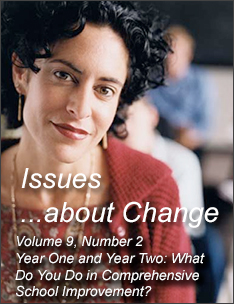Conclusions
Through the FIRST initiative, SEDL has developed a body of research on school improvement efforts that includes close study of five schools in the process of change, a widening library of strategies for supporting school change, and confirmation of the critical role change agents can play in schools undertaking improvement and change. As outside agents, change facilitators can develop a clearer view of dynamics that support and impede change efforts, and provide and build resources and abilities. In addition, they can offer assistance that is free of existing power relationships and requirements, can advocate for all school personnel, and, most importantly, can maintain the focus of improvement efforts on improved instruction and increased student achievement.
While increased student achievement is the goal of any responsible school improvement effort, administrative and organizational difficulties must often be addressed before a coherent view of the student body and its needs can be formulated and connected to staff capabilities and goals. Left unaddressed, issues of leadership, organization, and context, as well as personal and social dynamics can derail school improvement efforts and sap the energy of the most gifted and dedicated teachers. Most critically, if these issues are not addressed and a schoolwide improvement effort is not advanced, the quality of education individual students receive can become simply a matter of chance and class assignment.
School change is a daunting proposal, and school change professionals must develop and utilize a deep and broad variety of strategies for assisting schools in change and improvement. Change facilitators must be able to respond to the particular issues of a school, and must be willing to devote time and attention to developing a clear understanding of the school's readiness and its cultural ethos, in order to adapt and implement change strategies that are specific to each school's circumstance. In addition, change agents must maintain an awareness of more universal issues in education - including administrative turnover, fluctuating funds, and student populations that are increasingly diverse and face increasing demands, both academic and personal.
Next Page: Credits

